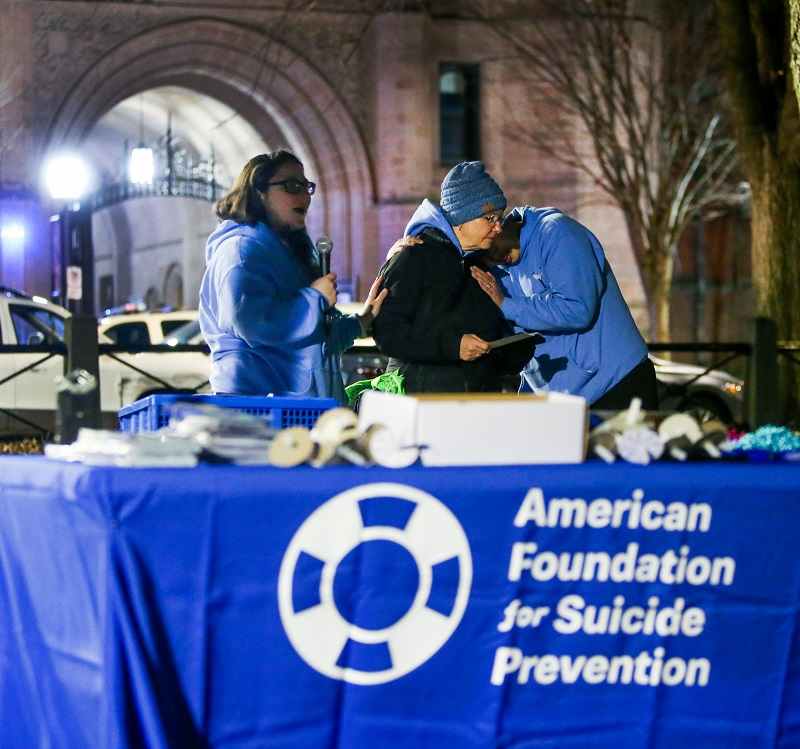
Yale students pass by Sterling Library on their way to and from classes.
14:22 JST, November 18, 2022
Yale University President Peter Salovey wrote a letter to Yale alumni Wednesday defending the university’s mental health services and the way it treats suicidal students, while also detailing plans for more resources and possible changes to policy.
His letter followed a Washington Post story in which current and former students described being pressured by university administrators to withdraw once the university learned about their mental health problems and being forced to reapply to get back into the university.
Before the story was published last week, Yale officials repeatedly declined to discuss the university’s withdrawal and reinstatement policies or address any of the accounts offered by students and former students.
On Wednesday, Salovey said the article “misrepresents our efforts and unwavering commitment to supporting our students, whose well-being and success are our primary focus.”
In the story, more than 25 current and former students described their frustrations with a university flush with a $41.4 billion endowment, yet beset by what they said are inadequate services and policies for those in mental crisis.
Some recounted seeking help and never hearing back. Others were given limited, 30-minute-long therapy sessions because of staff constraints. Many said they learned to hide mental problems and suicidal thoughts to avoid triggering withdrawal policies that they believe are designed to protect Yale from lawsuits and damage to its reputation.
And those pressured to withdraw said they were given 72 hours or less to leave campus – with one student being met by campus police upon discharge from a psychiatric hospital and given two hours to pack her possessions and vacate her dorm.
“To be clear, the health and well-being of Yale students are primary university priorities,” Salovey wrote. “The Washington Post article does not reflect Yale’s efforts to foster student wellness. The article fails to acknowledge the support, processes, and policies in place or the positive outcomes associated with our work.”
Salovey said the university plans to take action in coming months to improve mental health services and explained the efforts it has already made in recent years to make the reinstatement process less onerous and expensive.
In the coming year, the university will open a new counseling site. Salovey said a committee has been meeting in recent months “to continue the review of our withdrawal and reinstatement policies. This group is poised to roll out policy changes in stages that will continue to support students.”
Two other Yale administrators – Yale College Dean Pericles Lewis and Paul Hoffman, Yale’s director of mental health and counseling – also wrote a letter to the editor Tuesday, alleging the article ignored the “complex and nuanced endeavor” of addressing student mental health and said it “could put more students at risk” by leaving them with the impression they should stay in college at the expense of their well-being.
In an interview Thursday, Lewis said the university plans to hire nine additional mental health clinicians in the coming year, bringing the total number to nearly 60. And the new counseling center opening in the coming year will be Yale’s third such site in New Haven.
Lewis said possible changes to the university’s withdrawal policies may be announced in coming weeks, but characterized them as not “any radical revisions of policy, but updating of documents and making sure that everything’s clear.”

NEW HAVEN, CT – APRIL 3: Pam Shaw, mother of Rachael Shaw Rosenbaum, a Yale student who died by suicide last year in March 2021, is comforted at a candlelight vigil on the New Haven Green organized by the group Elis for Rachael.
Lewis noted that administrators are trying to address one problem raised by The Post story – how students in crisis who withdraw from Yale lose their health insurance and access to therapy at the moment they need it most.
“I’m not sure that I will know for sure whether we’re able to do it for another few weeks or so,” he said. “But we are in the process of looking at that . . . the question of cost and insurance for those who come from families that don’t have insurance.”
Lewis said university administrators wrote the two letters in response to concern from alumni following The Post’s article.
“I wanted to make clear that the mental health of our students is a very, very high priority and that we seek to pursue the policies and practices that are going to ensure that,” he said. “In particular, that are going to help prevent suicide. And that’s the basis for our decision-making and nothing else.”
Many current and former students expressed frustration with Salovey’s letter and the administration’s response.
“They missed the whole point of the article and those students who were brave enough to speak out,” said Alicia Floyd, who withdrew after a suicide attempt in 2000 and now works as a doctor. “The problem is how awful they can make it to leave and return. And how that discourages people in pain from seeking help or taking the time off that they need.”
Last year, Floyd and others created a nonprofit called Elis for Rachael to press Yale to change its mental health policies.
“The letter shows how disconnected the administrators are from our experiences,” said Akweley Mazarae Lartey, 22, a senior at Yale. “Their policies have an enormous effect on students, especially those who need support, who are low-income, come from marginalized backgrounds. Or are trans and nonbinary, like me.”
Lartey – a leader in a disability rights student group called DEFY – recalled struggling with mental health his first year at Yale and being warned not to reveal too much to his Yale counselors because of the withdrawal policy. Lartey said he also struggled to find any counselors who understood his problems as a nonbinary student.
“We don’t just desperately need policy reform and more resources,” he said, “but way better and more diverse counselors.”
The scrutiny and discussion of changes comes after more than a decade of criticism of Yale’s withdrawal policies. In 2015, students demanded change after a Yale sophomore cited the withdrawal policy in an online post shortly before she killed herself. Last year, a freshmen killed herself just days after agonizing in online posts about the possible consequences of withdrawing.
Before the article’s publication, Yale administrators refused to provide The Post with statistics on reinstatement. In Salovey’s letter, he said: “Over 90 percent of students who were medically withdrawn are reinstated at their first request; over 99 percent on their second; and 100 percent by their third request.”
Those numbers include students who withdraw for physical as well as mental reasons. Lewis said the majority of medical withdrawals are for mental health reasons. When asked how many students who withdraw decide to reapply, Lewis said he did not have that data.
“Even if 90 percent are reinstated on their first try, what that doesn’t capture is the stress and trauma created by this cruel and absurd process,” said Rishi Mirchandani, who withdrew in 2018 after suffering from suicidal thoughts and reapplied twice before being reinstated. “It doesn’t capture the logistical and financial hurdles. The anxiety and limbo you’re forced to live in while you wait for them to make their judgment. No one disagrees time off can be necessary and lifesaving. But it should be simple and flexible and supportive. Right now, it’s none of those things.”
Miriam Kopyto, 22, a senior and a leader in the Yale Student Mental Health Association, said many on campus have contacted her group in the wake of The Post’s story, asking how they can help improve campus mental health.
“I’ve been working for years – between my classes and job – to try to get administrators to pay attention to these issues. And it’s so often felt like we’re invisible to them,” Kopyto said. “I hope things really do improve. I would so love to see that.”
Top Articles in News Services
-

Survey Shows False Election Info Perceived as True
-

Prudential Life Expected to Face Inspection over Fraud
-

Hong Kong Ex-Publisher Jimmy Lai’s Sentence Raises International Outcry as China Defends It
-

Japan’s Nikkei Stock Average Touches 58,000 as Yen, Jgbs Rally on Election Fallout (UPDATE 1)
-

Japan’s Nikkei Stock Average Falls as US-Iran Tensions Unsettle Investors (UPDATE 1)
JN ACCESS RANKING
-

Japan PM Takaichi’s Cabinet Resigns en Masse
-

Japan Institute to Use Domestic Commercial Optical Lattice Clock to Set Japan Standard Time
-

Israeli Ambassador to Japan Speaks about Japan’s Role in the Reconstruction of Gaza
-

Man Infected with Measles Reportedly Dined at Restaurant in Tokyo Station
-

Videos Plagiarized, Reposted with False Subtitles Claiming ‘Ryukyu Belongs to China’; Anti-China False Information Also Posted in Japan

























